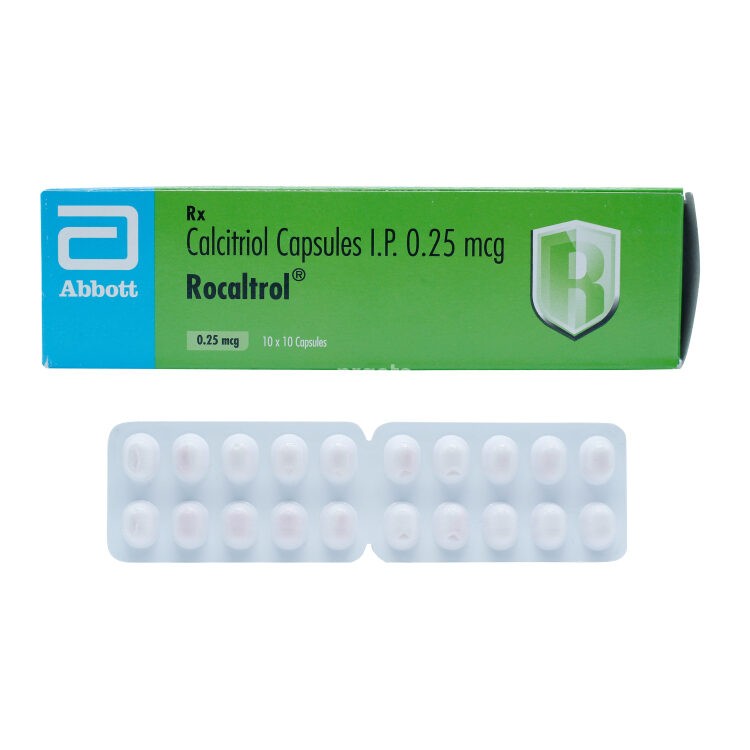
Contents
Side Effects of Rocaltrol (calcitriol)
Rocaltrol (calcitriol) is a synthetic form of vitamin D3 used to treat low levels of calcium in the blood of patients with kidney disease or problems with their parathyroid gland. The gland controls calcium levels through the secretion of parathyroid hormone.
Calcium plays a vital role in maintaining bone health, and low levels can cause bone disease. Rocaltrol increases calcium absorption in the kidneys and intestines and promotes the release of calcium from the bones. It helps the body utilize calcium from food and supplements.
Common side effects of Rocaltrol include:
- hypercalcemia (high blood calcium levels)
- hypercalciuria (high urinary calcium levels)
- hyperphosphatemia (high blood phosphate levels)
Serious side effects of Rocaltrol include interactions with other vitamin D products, which can lead to additive side effects and toxicity. Medications such as cholestyramine, colestipol, mineral oil, and orlistat may decrease the absorption of Rocaltrol in the intestine. Drugs like phenytoin and phenobarbital can reduce blood concentrations of Rocaltrol, requiring higher doses for effective treatment. Thiazide diuretics can elevate blood calcium levels, leading to hypercalcemia when combined with Rocaltrol.
It is important to use Rocaltrol cautiously when taking digoxin, as high calcium levels can cause symptoms of digoxin toxicity. Ketoconazole can inhibit the metabolism of Rocaltrol, leading to excessive vitamin D effects. Magnesium-containing medications should be avoided by patients undergoing chronic renal dialysis, as they can increase blood magnesium levels.
There are no sufficient studies on the use of calcitriol during pregnancy. Rocaltrol may be excreted in breast milk, so breastfeeding should be avoided while taking this medication.
Important Side Effects of Rocaltrol (calcitriol)
WARNING
Excessive vitamin D can cause hypercalcemia, hypercalciuria, hyperphosphatemia, and bone disease. Avoid vitamin D and its derivatives during calcitriol therapy to prevent complications.
Hypercalcemia has been reported in patients treated with calcitriol. Avoid sudden changes in dietary calcium intake and maintain adequate hydration during treatment.
Rocaltrol (calcitriol) Side Effects for Healthcare Professionals
Rocaltrol is a synthetic hormone that mimics vitamin D activity. Adverse effects resemble those seen with excessive vitamin D intake, including hypercalcemia syndrome or calcium intoxication, depending on the severity and duration of hypercalcemia.
Calcitriol has a short half-life, so serum calcium levels normalize quickly after treatment withdrawal. Early signs of vitamin D intoxication include weakness, headache, nausea, dry mouth, and bone and muscle pain. Late signs may include weight loss, anorexia, urinary and sensory disturbances, and urinary tract infections.
Elevated serum creatinine levels and soft-tissue calcification can occur with concurrent hypercalcemia and hyperphosphatemia. Hypersensitivity reactions, such as pruritus and rash, may occur in susceptible individuals. Report any suspected adverse reactions to Validus Pharmaceuticals LLC or FDA.
Drug Interactions with Rocaltrol (calcitriol)
Cholestyramine
Cholestyramine can reduce intestinal absorption of Rocaltrol.
Phenytoin/Phenobarbital
Phenytoin or phenobarbital administration does not affect calcitriol concentrations but may lower levels of endogenous vitamin D. Adjust Rocaltrol dosage accordingly.
Thiazides
Thiazides reduce calcium excretion and can cause hypercalcemia when used with Rocaltrol. Use caution when coadministering these medications.
Digitalis
Calcitriol dosage must be determined with care in patients on digitalis treatment, as hypercalcemia can trigger cardiac arrhythmias.
Ketoconazole
Ketoconazole inhibits enzymes responsible for calcitriol metabolism, resulting in reduced serum levels. The interaction with Rocaltrol has not been studied.
Corticosteroids
Antagonism exists between vitamin D analogues and corticosteroids, which inhibit calcium absorption.
Phosphate-Binding Agents
Phosphate-binding agent dosage should be adjusted based on serum phosphate levels when taking Rocaltrol.
Vitamin D
Avoid high-dose vitamin D during treatment with Rocaltrol to prevent additive effects and hypercalcemia.
Calcium Supplements
Avoid uncontrolled intake of additional calcium-containing preparations.
Magnesium
Avoid magnesium-containing preparations if undergoing chronic renal dialysis and taking Rocaltrol to prevent hypermagnesemia.
Summary
Rocaltrol is a synthetic form of vitamin D3 used to treat low blood calcium levels in patients with kidney disease or parathyroid gland problems. Common side effects include hypercalcemia, hypercalciuria, and hyperphosphatemia. There is limited research on the use of calcitriol in pregnant women, and it may be excreted in breast milk. It is important to monitor calcium levels and stay hydrated during treatment.


